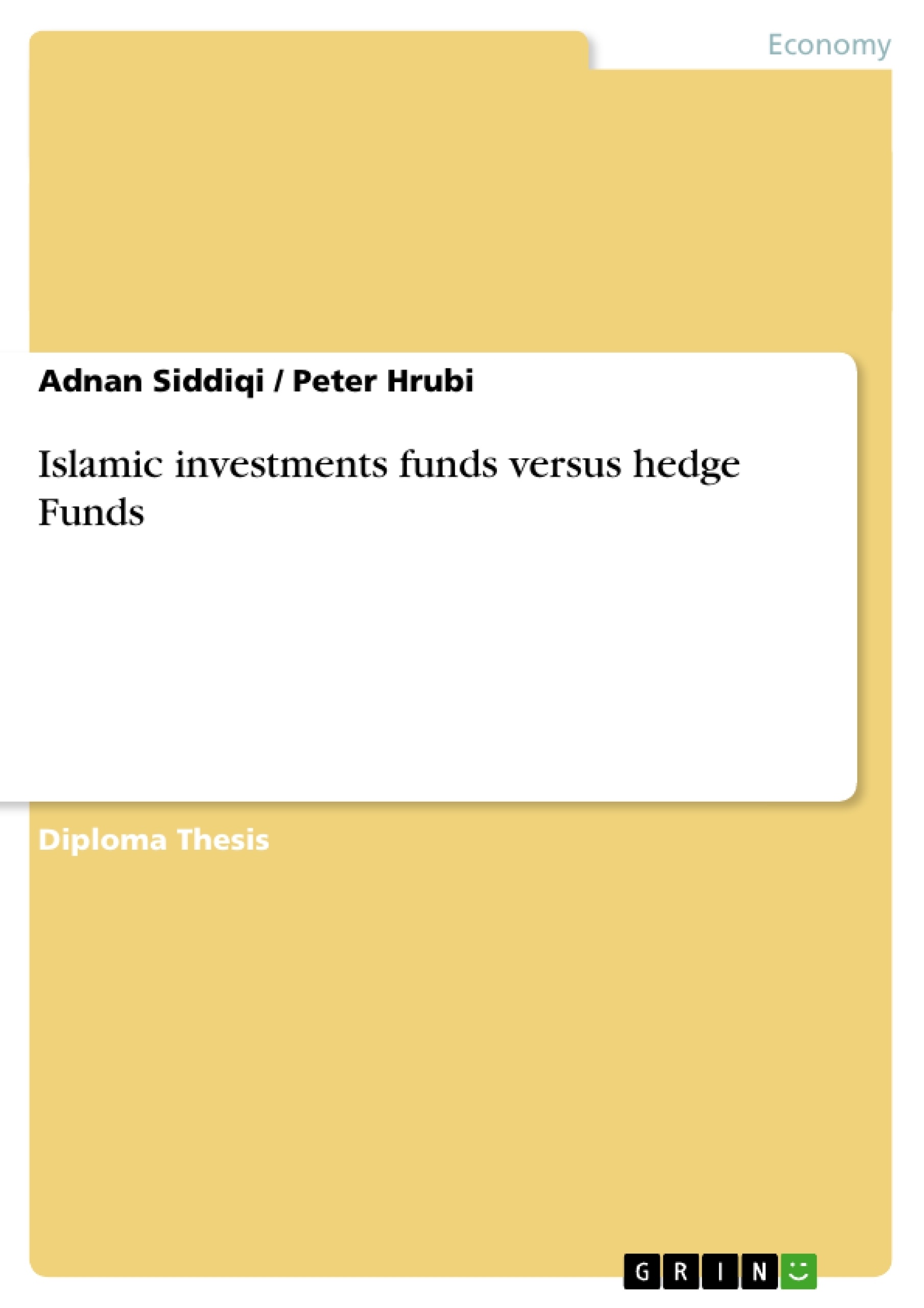The literature discusses Islamic investment funds and hedge funds as isolated issues. At present not much work is known, comparing these two very prominent alternative investment forms. This thesis attempts to fill this gap by providing a first insight into both and also tries to answer the following question: Can Islamic investment funds catch up with hedge funds? For this, the thesis compares Islamic investment funds and hedge funds on the basis of different factors, trying to answer three sub questions: What are the advantages and disadvantages of each? Are there differences and/or similarities between the two? How can an investment portfolio including both be balanced?
As will be seen throughout the thesis, Islamic investment funds provide a handfull of advantages over hedge funds, even enabling the former to outperform the latter.
Hedge funds rely mainly on gaining advantage through market inefficiencies, hedging the market risk through short-term opportunities. This construction puts the fund manager into a high risk position with high profit potential. Despite investment restrictions under Islamic law, a fund manager is not prohibited from facilitating hedge funds by these restrictions. The main difference is that Islamic investments offer more risk control by cooperative arrangements. This characteristic enables an investor to cover the risk of hedge funds by investing in Islamic investment funds. Nevertheless, such differences raise the issue of whether it is sensible to invest solely in Islamic investment funds or hedge funds.
[...]
Inhaltsverzeichnis (Table of Contents)
- INTRODUCTION
- Background
- Statement of the problem
- Objectives
- Justification
- Structure
- ISLAMIC INVESTMENT FUNDS
- What are Islamic investment funds?
- The Shariah
- The principles of Shariah
- The Shariah board
- Historic and future development
- Financing in the beginning of Islam
- Islamisation of the economy - Pakistan in its outrider role
- The history of the Islamic capital market
- Current market environment of Islamic capital market
- Further development of Islamic capital markets
- Special characteristics of Islamic finance
- Interest in Islamic finance
- Risk in Islamic economics
- Gharar
- Financial engineering in Islamic finance
- Principles of financial engineering
- Strategies for product development
- Special characteristics of Islamic investment funds
- Shariah principles for Islamic investment funds
- Investing in shares
- The purification
- Difficulties of adopting existing regulations
- Regulation of Islamic investment funds
Zielsetzung und Themenschwerpunkte (Objectives and Key Themes)
This thesis aims to provide a comparative analysis of Islamic investment funds and hedge funds, filling a gap in the existing literature. The work investigates whether Islamic investment funds can compete with hedge funds and seeks to answer key questions regarding their advantages, disadvantages, similarities, differences, and the possibility of balancing an investment portfolio through the use of both.
- Comparison of Islamic investment funds and hedge funds
- Advantages and disadvantages of each investment form
- Similarities and differences between the two
- Balancing an investment portfolio through the use of both
- The potential of Islamic investment funds to outperform hedge funds
Zusammenfassung der Kapitel (Chapter Summaries)
The thesis begins by providing a comprehensive introduction, outlining its background, objectives, justification, and structure. This is followed by a detailed exploration of Islamic investment funds, covering their definition, Shariah principles, historical development, special characteristics, and financial engineering strategies. The chapter concludes with a discussion on the challenges of adopting existing regulations for Islamic investment funds.
Schlüsselwörter (Keywords)
This thesis focuses on the key concepts of Islamic investment funds, hedge funds, Shariah principles, Islamic finance, risk management, and investment portfolio optimization. The work investigates the potential of Islamic investment funds to outperform hedge funds and explores the differences and similarities between these two alternative investment forms.
Frequently Asked Questions
What are Islamic investment funds?
These are investment vehicles that comply with Shariah principles, prohibiting interest (Riba), uncertainty (Gharar), and investments in forbidden industries like alcohol or gambling.
Can Islamic funds compete with traditional hedge funds?
Yes, the thesis explores how Islamic funds can sometimes outperform hedge funds due to stricter risk control and cooperative arrangements.
What is the role of a Shariah Board?
A Shariah Board consists of Islamic scholars who monitor and certify that the fund's activities and products remain compliant with Islamic law.
How do Islamic funds handle "impure" income?
Through a process called "purification," where any small percentage of income derived from non-compliant sources (like interest) is donated to charity.
What is Gharar in Islamic finance?
Gharar refers to excessive uncertainty or speculation in a contract, which is prohibited to protect investors from unfair exploitation.
- Citation du texte
- Mag.rer.soc.oec Adnan Siddiqi (Auteur), Peter Hrubi (Auteur), 2008, Islamic investments funds versus hedge Funds, Munich, GRIN Verlag, https://www.grin.com/document/114432



